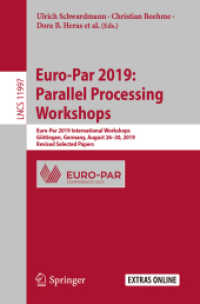- ホーム
- > 洋書
- > 英文書
- > Literary Criticism
Full Description
Criminal Moves: Modes of Mobility in Crime Fiction offers a major intervention into contemporary theoretical debates about crime fiction. It seeks to overturn the following preconceptions: that the genre does not warrant critical analysis, that genre norms and conventions matter more than textual individuality, and that comparative perspectives are secondary to the study of the British-American canon. Criminal Moves challenges the distinction between literary and popular fiction and proposes that crime fiction be seen as constantly violating its own boundaries. Centred on three axes of mobility, the essays ask how can we imagine a mobile reading practice that realizes the genre's full textual complexity, without being limited by the authoritative self-interpretations provided by crime narratives; how we can overcome restrictive notions of 'genre', 'formula' or 'popular'; and how we can establish transnational perspectives that challenge the centrality of the British-American tradition and recognize that the global history of crime fiction is characterized, not by the existence of parallel national traditions, but rather by processes of appropriation and transculturation. Criminal Moves presents a comprehensive reinterpretation of the history of the genre that also has profound ramifications for how we read individual crime fiction texts.
Contents
Introduction: Criminal Moves: Towards a Theory of Crime Fiction Mobility
Jesper Gulddal, Stewart King and Alistair Rolls
Mobility of Meaning
1. Behind the Locked Door: Leblanc, Leroux and the Anxieties of the Belle Époque
Jean Fornasiero and John West-Sooby
2. Moving Fergus Hume's The Mystery of a Hansom Cab and Breaking the Frame of Poe's 'The Murders in the Rue Morgue'
Alistair Rolls
3. Reading Affects in Raymond Chandler's The Big Sleep
Heta Pyrhönen
4. Contradicting the Golden Age: Reading Agatha Christie in the Twenty-First Century
Merja Makinen
Mobility of Genre
5. Criminal Minds: Reassessing the Origins of the Psycho-Thriller
Maurizio Ascari
6. Foggy Muddle: Narrative, Contingency and Genre Mobility in Dashiell Hammett's The Dain Curse
Jesper Gulddal
7. Burma's Bagnoles: Urban Modernity and the Automotive Saccadism of Léo Malet's Nouveaux mystères de Paris (1954-1959)
Andrea Goulet
8. Secrecy and Transparency in Hideo Yokoyama's Six Four
Andrew Pepper
Transnational Mobility
9. The Reader and World Crime Fiction: The (Private) Eye of the Beholder
Stewart King
10. From Vidocq to the Locked Room: International Connections in Nineteenth-Century Crime Fiction
Stephen Knight
11. Brain Attics and Mind Weapons: Investigative Spaces, Mobility and Transcultural Adaptations of Detective Fiction
Michael B. Harris-Peyton







